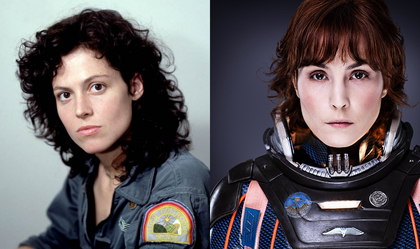If you’ve seen any of the Ridley Scott Alien films, then you know that the universe has got some serious Mommy issues. Whose impregnating whom, whose birthing whom, and what to do with your kids when they try to come back and burn your face away with their acid blood is kind of what the Xenomorph universe is about. So it’s no wonder that the Alien films have always had female protagonists at the heart of the action, women who represent the full scope of strong female characters. After all, this is the series that gave us Ellen Ripley, the quintessential kick-ass sci-fi heroine and arguably one of the toughest female protagonists of any film ever.
Now, in Ridley Scott’s new Prometheus, we’re introduced to Dr. Elizabeth Shaw, a scientist out looking for a little alien action in space. How does she stack up to our beloved Ripley? Let’s do a side by side.
(Spoilers to Prometheus ahoy!)
Ellen Ripley (Sigourney Weaver)
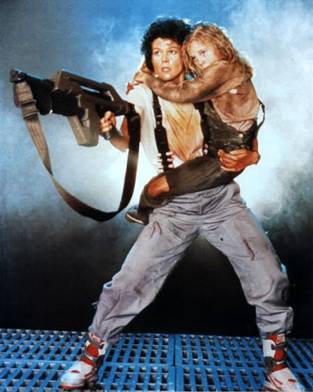
There’s been multitudes written about the unstoppable Ellen Ripley. As a character, she begins as a simple warrant officer on the Nostromo, out on a normal mission to a strange planet. We all know how that went. Ripley survives the events of Alien, even saves her cat, and returns to civilization, only to get dragged back out among the stars for an even worse encounter with the Xenomorphs in Aliens. There, it’s Mother Figure versus Big Mother as Ripley tries to protect little Newt from the Alien Queen. Ripley survives that fight, only to get herself stranded on the Fury 161 penal colony where she’s got to deal with being the only lady in town and, oh yes, more Xenomorphs, in Alien 3. And did we mention she’s been impregnated to birth the Queen Alien? Oh yes, and kills herself so that the Queen baby won’t get out? That is one seriously tough woman, no doubt. Then, just when you thought she might get a chance to rest in piece, Ripley is brought back as a cloned half-Alien with acidic blood in Alien: Ressurection. There, she’s got to teach her own Alien children some manners by killing them all horribly before the Auriga gets to Earth and rains Xenomorphs down on all of mankind.
That, in a nutshell, is the awesomeness that is Ellen Ripley in one paragraph. When looking at her representation in the films, one can’t help but acknowledge why she’s considered one of the greatest on screen protagonists of all time. As a heroine, she is everything one can hope for: kind yet firm, compassionate yet commanding, and capable of equally taking care of a scared child as much as defending the human race from alien impregnation and destruction. After all, this is the woman who made famous the “Get away from her, you bitch!”—later copped by Molly Weasley in Harry Potter. Ellen Ripley is the original deal in female maternal rage.
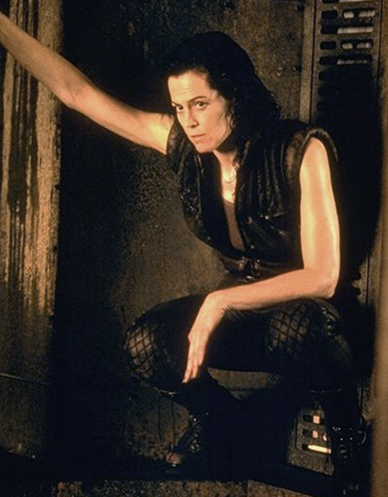 Ripley also has the problem of her own isolation over the films to deal with. Her daughter dies while she is away in space and as time goes on, other humans begin to find her off-putting due to her (rightful) obsession with the xenomorph threat. Every time she gets close to someone, be they Newt or Hicks or the doctor from Fury 161, they die. By the time she’s stranded on that all-male penal colony, her isolation from support could not possibly be more clear—due to her experiences, Ripley is set apart from others, alone in her fight. And when she is brought back from the dead as a half-Alien, she is literally separated from all mankind by no longer being one of them. Yet even that separation doesn’t keep Ripley from protecting the human race with every weapon in her arsenal.
Ripley also has the problem of her own isolation over the films to deal with. Her daughter dies while she is away in space and as time goes on, other humans begin to find her off-putting due to her (rightful) obsession with the xenomorph threat. Every time she gets close to someone, be they Newt or Hicks or the doctor from Fury 161, they die. By the time she’s stranded on that all-male penal colony, her isolation from support could not possibly be more clear—due to her experiences, Ripley is set apart from others, alone in her fight. And when she is brought back from the dead as a half-Alien, she is literally separated from all mankind by no longer being one of them. Yet even that separation doesn’t keep Ripley from protecting the human race with every weapon in her arsenal.
Ripley’s arc is one of the evolution of a woman from youth and relative innocence to protective mother figure to the wise older matron, out to correct the slaughtering ways of errant grandchildren—who happen to be Xenomorphs.Against that kind of badass trajectory, how can anyone stack up? Let’s take a look now at the new female protagonist of Prometheus to see how she lives up to the Ripley legacy.
Dr. Elizabeth Shaw (Noomi Rapace)
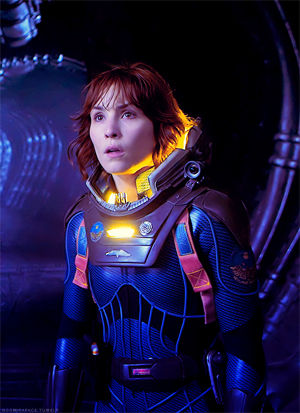 Elizabeth Shaw is a scientist out to discover why a multitude of cultures on Earth have the same designs in their artwork, a plot point brought out by the Alien vs. Predator movie back in 2004. She and her partner Charlie are the heart behind the Prometheus crew, the “true believers” in discovering the origins of mankind. Elizabeth is also represented as a spiritual woman, having inherited a religious background from her father, and falls back upon her belief in her theories as her backbone when things get tough. Unlike Charlie, Elizabeth does not lose determination even when her theories and ideas are challenged due to that core of faith.
Elizabeth Shaw is a scientist out to discover why a multitude of cultures on Earth have the same designs in their artwork, a plot point brought out by the Alien vs. Predator movie back in 2004. She and her partner Charlie are the heart behind the Prometheus crew, the “true believers” in discovering the origins of mankind. Elizabeth is also represented as a spiritual woman, having inherited a religious background from her father, and falls back upon her belief in her theories as her backbone when things get tough. Unlike Charlie, Elizabeth does not lose determination even when her theories and ideas are challenged due to that core of faith.
And get challenged she does. Just like Ripley, Shaw is introduced with the same maternal questions posed by many of the Alien films. We discover in the film that Shaw is not able to have children, which is a sore spot for her, and when presented with the possibility of alien invasion babies, Shaw is just as unenthused as Ripley. Still, where Ripley fights to remain unviolated by the alien menace, Shaw takes things one step forward in what might arguably be the most hardcore birth/abortion sequence of all time. Shaw refuses to become a host for an unwanted, invasive alien and takes the power into her hands to save her own life. In essence, she refuses the maternal role over the alien threat that Ripley embraces in the earlier films, putting herself and her quest for knowledge and survival first.
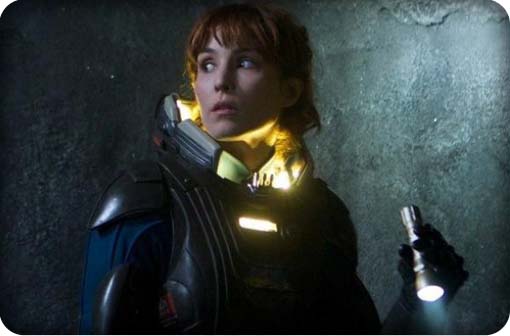 This self-protective determination is equally balanced by a peaceful streak light years wide. When she sees a fellow crew member wanting to bring weapons onto the alien world, she balks at the notion of violence. Shaw’s strength lies in her tender heart: she cares for her lover Charlie, the crew of the Prometheus, and even for the robot David. Yet as those support structures are stripped away, Shaw shows the same determination to protect human life that made Ripley so powerful as a character. For a woman battling for her life in the Alien universe, Shaw does it with her convictions and her determination to survive, rather than with a gun.
This self-protective determination is equally balanced by a peaceful streak light years wide. When she sees a fellow crew member wanting to bring weapons onto the alien world, she balks at the notion of violence. Shaw’s strength lies in her tender heart: she cares for her lover Charlie, the crew of the Prometheus, and even for the robot David. Yet as those support structures are stripped away, Shaw shows the same determination to protect human life that made Ripley so powerful as a character. For a woman battling for her life in the Alien universe, Shaw does it with her convictions and her determination to survive, rather than with a gun.
An interesting difference between the two heroines also lies in Shaw’s status as a true believer. Where Ripley was pragmatic in her want to return to Earth and a safer, calmer life, Shaw is a seeker of the unknown. She is propelled out into the stars not for money, but for the chance to answer one of life’s greatest questions: where do we come from? That sets Shaw apart as an idealist from the practical Ripley, a seeker of knowledge where Ripley is the defender against the unknown.
So that’s the two women. But wait, there’s one more main female protagonist to be considered in the Alien franchise. Dare we touch on the much bashed but somewhat interesting AvP ?
Bonus Comparison: Alexa Wood (Sanaa Lathan)
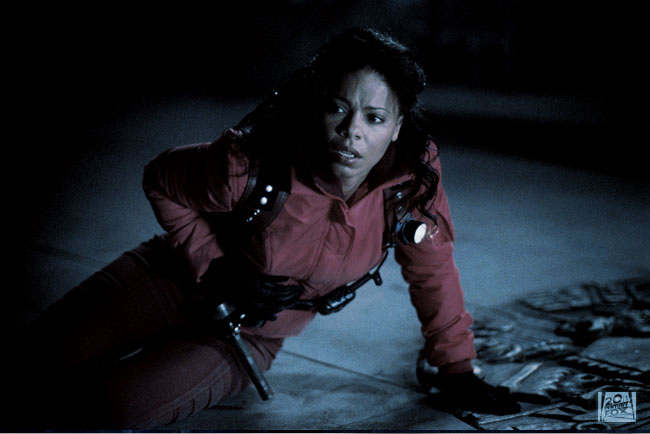
So a lot of bad things have been said about the Alien versus Predator movie, but this train wreck of a film did at least one thing correctly. Despite a bad script and wooden acting, AvP at least kept the tradition of strong female protagonists alive in Sanaa Lathan’s Arctic guide, Alexa Wood. For that alone, she bears at least mentioning.
Alexa is a die-hard survivor like Ripley, a woman experienced in traversing frozen wastelands and dealing with tough men on a regular basis. She stands up to millionaires and scientists alike and, as a bonus, has to fight her way through a shifting underground temple full of not only one, but two species of aliens trying to kill her. She makes quick assessments of what is more dangerous and devises a strategy to fight alongside the Predators to deal with the Xenomorph threat. She is a warrior through and through, something that is recognized by the Predators by the end of the film when they reward her with a token of warrior’s respect. Now how many humans can say they get that?
Still, for all her kick-ass portrayal, Wood loses a lot of the themes that make the women of the Xenomorph universe badass in that there’s nothing maternal or caring about her. She is aloof and cool, the typical two-dimensional portrayal of a ‘kick-ass chick’ in a badly done movie. Sure, she may kill aliens well, but does she have much else to stand on? Not really. And that’s the failure of AvP as much as anything else.
The Final Analysis
One can make points about both Ripley and Shaw being wonderful representations of women heroes, but it’s hard to argue with the original being better. Noomi Rapace’s performance, while stellar, can’t touch Sigourney Weaver’s intensity as Ripley and Prometheus, while a great addition to the Alien universe, simply can’t stack up against the first two films for depth, tension and character evolution. Still, Elizabeth Shaw is a different kind of Alien heroine from Ripley, an idealist whose vision carries her beyond the violence and slaughter that comes with interacting with the dangers of space, and that’s something to be respected too. In the end, I think the universe has place for both strong women and (hopefully) many more to come.
Shoshana Kessock is a comics fan, photographer, game developer, LARPer and all around geek girl. She’s the creator of Phoenix Outlaw Productions and ReImaginedReality.com










